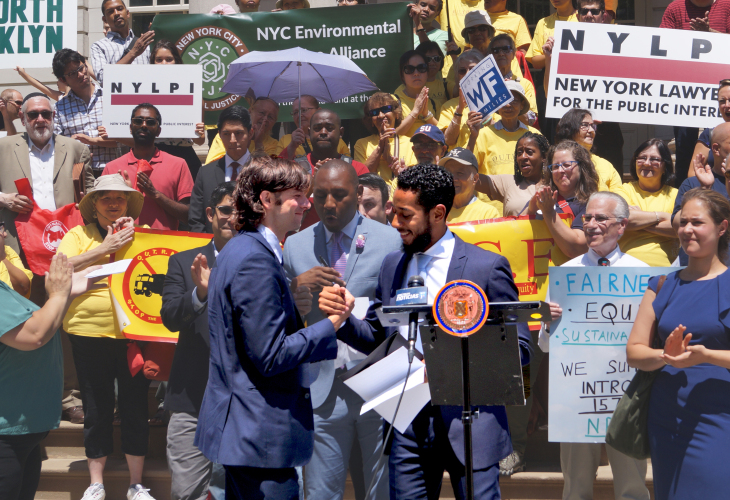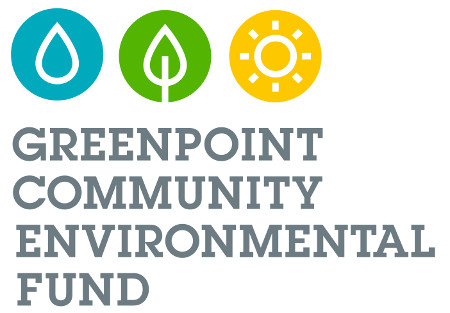New York City Council passed Intro 157 last week. This bill represents a significant step forward for environmental justice for our North Brooklyn community. Here’s a terrific repost from our friends at Greenline.

At the rally before the council voted on Intro 157c, lead sponsor Council Member Antonio Reynoso (center right) thanked Council Member Stephen Levin (center left) for his co-sponsorship and input on the bill, which will bring more environmental justice to their districts.
The summer knows the summer nose. When the weather gets warmer scents become more potent; that goes for the sweet and for the stinky. As it’s the stinky that carries the harder punch, it is fitting then that in the heat of mid-July the City Council passed Intro 157c. This bill punches back and will put a cap on trash capacity in overburdened neighborhoods. The bill’s supporters see its passing as a step toward making the trash distribution playing field a fairer representation amongst the boroughs.
It’s been a long haul for a bill addressing the environmental injustice that has North Brooklyn, Southeast Queens, and the South Bronx dealing with 75% of the city’s waste transfer processing capacity. In addition to bearing an inequitable amount of the city’s waste, these neighborhoods have an increase in environmental hazards brought with trash transportation. Studies show the pollution from truck traffic increases illnesses such as asthma in these areas. A quicker lethal consequence was discovered by transit expert Charles Komanoff in his 1999 study, “Killed by Automobile”, which presented data that operators of private trash trucks killed more pedestrians per mile driven than any other type of vehicle in NYC. Nineteen years later this data seems to hold, as in the last six months of 2017 two people (Neftaly Ramirez 07/22-3/2017 and Mario Lopez on 12/19/2017) were killed by waste haulers in just the Williamsburg/Greenpoint area.
Intro 157c has roots in legislation begun by Diana Reyna when she was on the NYC Council, roughly a decade ago. In December 2017 a version called Intro 495, which was introduced in 2014, almost passed. Forms of this legislation failed under the previous two speakers, but Speaker Corey Johnson’s support brought new hope environmental justice would have its day and the bill would pass as version Intro 157.
“After a long uphill battle, the passage of Intro 157 will finally deliver environmental justice to front-line communities and ensure that no other neighborhood suffers the same, while setting a historic precedent for the fair share distribution of burdensome and polluting facilities in the City of New York. Currently, low-income communities of color handle a staggeringly disproportionate amount of our City’s waste. Residents are exposed to dangerous truck traffic, elevated air pollution, and hazardous environmental impacts— contributing to historical inequities in resource distribution along economic and racial lines.” stated Council Member Antonio Reynoso, the lead sponsor of the bill. “It is legislation anchored in equity.”

Current waste transfer stations with their permitted capacity and average daily waste in 2017 Map created by bcheney of Carto
During the vote, one of the criticisms of the bill was that it could cost jobs. Council Member Stephen Levin, who co-sponsored the bill, answered this by calling attention to the research that estimates only 13–16 jobs might be lost and a safeguard within the bill documents those who have been displaced so they can be accessed when openings come up.
“In its present state Intro 157 isn’t a solution for southeast Queens. However, HOWEVER it does move us in the right direction to start to act on a vital matter that impacts our communities. I know this is not the beginning or the end of this conversation. … I welcome the continued dialogue,” said Council Member Adrienne Adams of District 28 (Southeast Queens) as part of the explanation of her “aye” vote for Intro 157.
The final vote was 32-13 in favor of the bill. This was a cause for celebration for North Brooklyn, yet no one is resting on these laurels. Intro 157 namely addresses: “reducing permitted capacity at putrescible and nonputrescible solid waste transfer stations in overburdened districts”. The fight for the necessary other aspects of environmental justice continues with a big step forward.





